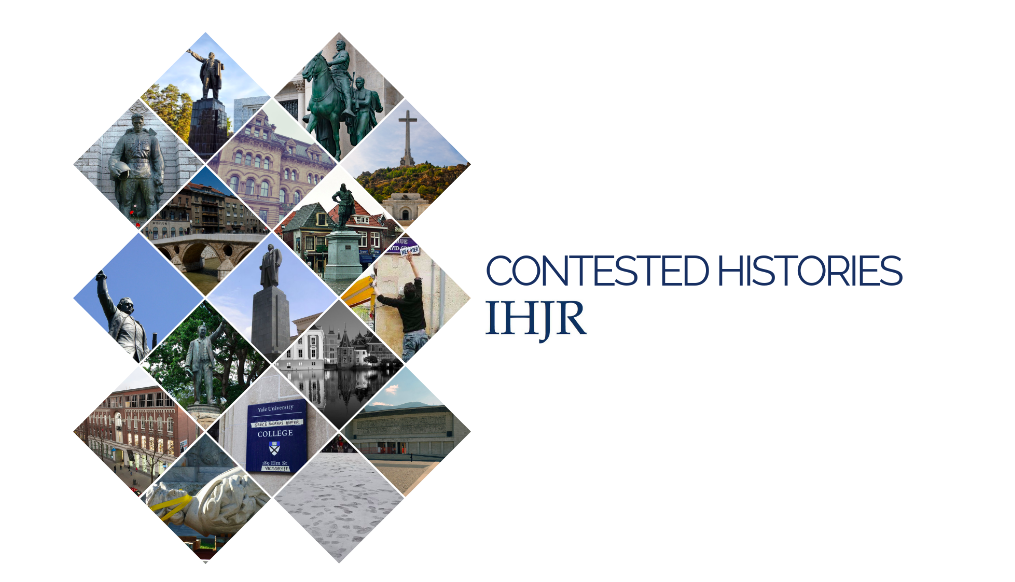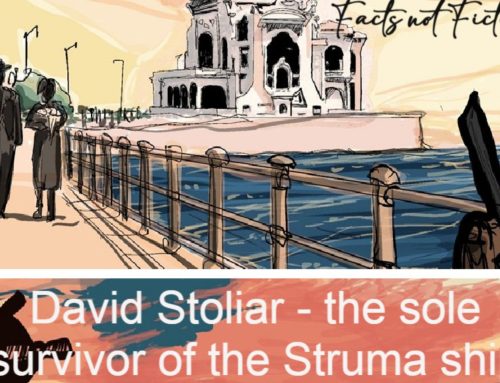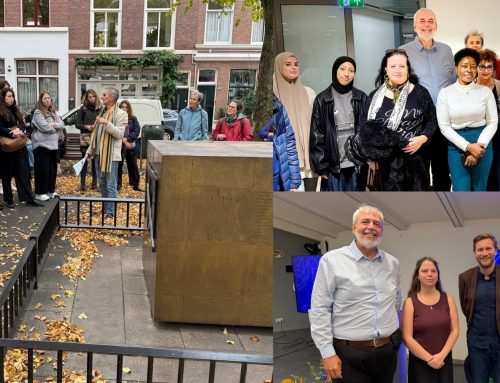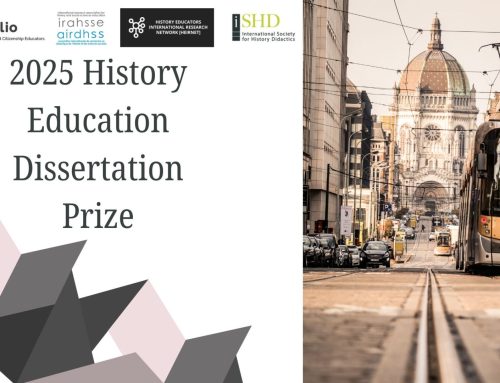This article was triggered by a new collaboration between the Contested Histories Initiative and students in ‘Narratives of the Past’ from France. Contested Histories is a multi-year project designed to identify principles, processes and best practices for addressing these contestations at the community or municipal level and in the classroom. As of September 2020, the project has identified more than 200 cases around the world with research conducted on more than 120 cases. Each case is catalogued in a database and added to a digital map. The long-term goal is to complete in-depth research on each case for review by experts, and create an online platform as a resource for a wide range of stakeholders.
Without research trainees and interns this feat would not be possible; collaborations with bright, motivated and dedicated students are the heart of the project. Research trainees come to the project from EuroClio’s traineeship programme, while research interns join us from associated universities. In addition, we welcome select independent researchers as interns and professional volunteers.
Which research organisations are involved?
Contested Histories (CH) is associated with a number of higher education institutions, namely Harvard University, University of Oxford and Erasmus University Rotterdam. Since 2017, more than 70 students–local and international–have taken on a research internship with CH and in doing so have made valuable contributions to the project. In December, we are welcoming an additional 22 students from the University of Oxford. This collaboration is integral to our project. Thanks to these engaged and bright young scholars, the project has grown enormously and has benefited from the various perspectives they bring. The diverse academic and personal backgrounds of research interns, as well as their language capabilities, are invaluable to our multidimensional and interdisciplinary approach to case study research and global mapping of cases.
What are our researchers working on?
Interns and the Contested Histories team participate in peer-review of completed cases, revising and updating where necessary, before a case is flagged for extended research and external review by experts in the given field. Several case studies have been published on EuroClio’s website. Launching the series of in-depth case studies in Spring 2020 was the Legacy of Cecil Rhodes at Oxford, written by Lucas Tse. At the time of writing, Lucas, a Rhodes scholar, was pursuing a Master’s of Philosophy in Economic and Social History at the University of Oxford and is currently reading for a Doctorate in the same subject, also at Oxford. Additionally, the Legacy of Sir Stamford Raffles in Singapore, written by Wan Yii Lee, was published in Summer 2020. Wan Yii Lee is a candidate for the Master’s of Philosophy in Development at the University of Oxford. Since completing her research internship with Contested Histories, she has been combing through archives and tracking local building histories in Singapore for her thesis on the politics of the built environment during the development of the nation-state. She’s excited to start the second and final year of the MPhil soon, during which she will be taking more courses on development economics and the politics of global health in Africa. Most recently, the case study on a Statue of Robert Towns in Queensland, Australia by Sebastian Rees, a recent Master’s of Philosophy graduate in Global History, has been published.
Why get involved with the project?
Joining the team of an international organisation presents a unique opportunity for young researchers. As an intern or trainee you will become part of a passionate and international team of a fast-growing initiative and receive individual support. Not only will you have the opportunity to build up your research portfolio, CV, and network, but you will also have relative freedom to choose topics or regions that are of personal or academic interest to you, As a global study the scope is vast, giving you the added option of exploring new interests–ranging from legacies of Japanese imperialism to toppled confederate monuments in the United States–with original research and editing tasks. Additionally, we offer an online work environment with flexible hours, ideal for gaining experience while adhering to coronavirus restrictions.
What do the interns have to say about their experience?
A conversation with Pierce, co-author of the upcoming case study on murals in Belfast.
What was your favorite aspect of your research internship with Contested Histories?
My favourite aspect of the research internship with Contested Histories was the freedom and trust given to us as budding researchers to explore pressing and sensitive topics. The atmosphere was hugely supportive, resulting in case studies that will hopefully give more exposure to these struggles around the world, and, moving forward, perhaps offer a more robust and nuanced framework as to how they may be handled.
How has your experience helped your professional development?
The experience has been highly beneficial to my professional development. Not only has it increased my confidence in my own writing and researching abilities, I also had the pleasure of meeting a network of energetic researchers and history professionals from whom I learned a lot.
How do you feel about getting your case study published?
It’s really an honour to have a case study published, particularly one so close to home for me. I’m very pleased to share the Belfast Murals case. As with every example of Contested History, it has its own unique set of circumstances, but it also concerns issues of history, sectarianism, economics and creativity that I believe are relevant to many other cases. I owe a lot to EuroClio, the IHJR and to Luke, the contributing author, who updated the piece.
Would you recommend doing an internship with Contested Histories? If so, why?
I would absolutely recommend an internship with Contested Histories. As we can see, these issues are not going away quietly, so to feel like you are contributing in some small way to how they may be handled constructively in the future is highly rewarding. In addition, the opportunity to work with a great team in a forward-thinking and thought-provoking environment was an invaluable learning experience.
Staying involved as a professional volunteer
Some students remain dedicated to the project even after their traineeship or internship has ended and continue as professional volunteers.
“Whether in the context of the West reckoning with its colonial past or former Soviet states reconciling antagonistic historical narratives to recover or reaffirm their own distinct identities, history has increasingly served as a flashpoint for conflict over the past three decades. I chose to continue working on Contested Histories as I believe its contribution to the field of memory and security studies is invaluable and will shape dialogue around information warfare and geopolitical conflict in years to come. The project is driven by a dedicated team of internationally-based researchers who push me to challenge assumptions, continuously learn, and refine my skill set. It goes without saying – I couldn’t ask for better colleagues.” – Katria
“My research internship with IHJR solidified my professional interest in historical memory and gave me the practical experience necessary to write my undergraduate thesis and pursue research positions in the field. I returned as a professional volunteer because of the supportive team and the opportunity to raise awareness about this relevant topic.” – Miranda
The passion and energy that display is truly humbling to our organisation, we are excited to see more and more people raising awareness about the complexities and consequences of public memory.
Interested in joining the team?
Are you a research organisation or university looking for new opportunities?
Are you a student or recent graduate with an eye on a future in research or an independent researcher looking for a new project?
Then Contested Histories may be the perfect project for you.
Internship applicants must:
- Be in the final stages of their undergraduate degree or be enrolled in a Master’s of PhD programme with outstanding academic achievement, preferably in the area of history, international relations, or related fields
- Proven research and academic English writing and/or editing skills
- Fluency in English, additional language comprehension is a plus
- Willingness to commit a minimum of 5 hours per week for at least 3 months
- Willingness to join virtual weekly team meetings
- Some knowledge of WordPress and database management is an asset, not a must
Submit your CV, letter of motivation and names of 2 references to info@ihjr.org. Indicate also your availability to start, desired hours and duration of internship.
Interested research organisations or universities should email info@ihjr.org for further information.













